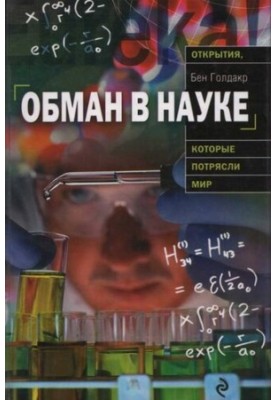Cheating in science : Bad science
 Instant download
Instant download
after payment (24/7)
 Wide range of formats
Wide range of formats
(for all gadgets)
 Full book
Full book
(including for Apple and Android)
The Deception of Science : “Bad Science” by Ben Goldacre is a vivid and sharp expose of the world of pseudoscience, unfair research and distorted data that will not leave indifferent any inquisitive reader who seeks to understand how sometimes science is subject to manipulation and errors. Translated by E. In. Kokoreva makes this book available to Russian-speaking readers, opening their eyes to how easy it is to fall into the trap of false scientific claims and how important it is to be able to critically perceive information coming from various sources. "Deception in Science: Bad Science" is not just a collection of facts or a boring textbook. This is a fascinating journey through the world of scientific myths, unfair experiments and marketing tricks hidden behind bright headlines and loud statements. Ben Goldacre masterfully shows how easy it is to confuse the reader, using pseudo-scientific arguments, unfounded conclusions and even falsification of data. The author not only exposes these schemes, but also teaches the reader to recognize them, developing critical thinking and analytical skills. This book is especially relevant for those interested in science, health, diets, alternative medicine and popular psychology. It is intended for a wide range of readers - from students and young professionals to adults who want to learn how to distinguish real scientific discoveries from marketing tricks. If you’ve ever wondered why some diets promise miracles and others turn out to be a waste of time, or how to determine that an article in a scientific journal is truly trustworthy, Cheating in Science will be your indispensable guide. Goldacre raises important topics ranging from data manipulation and misuse of statistics to the impact of commercial interests on scientific publications. It shows how easy it is to fall under the influence of pseudoscientific theories and why it is important to be able to distinguish verified facts from invented ones. The book reveals the mechanisms of spreading false scientific concepts and methods of exposing them, which makes it a valuable tool for those who want to learn to think critically and not succumb to the tricks of unscrupulous authors. Author's style - lively, witty and sometimes ironic . Goldacre is able to turn complex scientific topics into understandable and interesting stories, saturated with examples from real life. His other well-known works, such as Fake News and Information Warfare, demonstrate his ability to combine scientific rigor with the ease of filing material. In Cheating in Science, he continues this line by emphasizing the importance of honesty and transparency in scientific research. This book deserves attention not only because it helps to avoid mistakes and misconceptions, but also because it awakens in the reader the desire to be a more informed and responsible consumer of information. In an age of information overload, when everyone can publish anything, the ability to recognize the truth becomes especially valuable. “Deception in science” is not only an analysis of mistakes and tricks, but also a call for honesty, objectivity and scientific ethics. If you are looking for a book that will help you become a more critical and attentive reader, teach you how to distinguish scientific facts from marketing fraud and expand your understanding of how modern science works, then Ben Goldacre’s “Deception in Science: Bad Science” is exactly what you need. This book will be your reliable companion in the world of information, where truth and lies often go hand in hand, and will teach you not to believe everything by word, but to search for the truth yourself.
LF/469766041/R
Data sheet
- Name of the Author
- [пер. с англ. и ред. Е. В. Кокоревой]
Бен Голдакр - Language
- Russian
- Series
- Открытия, которые потрясли мир
- ISBN
- 9785699362172
- Release date
- 2010







